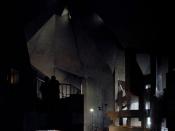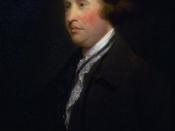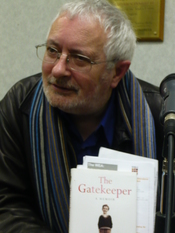Described as the age of enlightenment, 18th Century Britain became modish in itsÃÂ ways. An emerging trading industry allowed the nation to prosper and develop into a wealthy elite society, where ambition was smothering every opportunity to improve taste, class and wealth. An awareness of society was steadily rising due to heavy influence of newspapers, thus enabling a 'we' to develop. People began questioning fact, exploring and acquiring to new tastes; but the benchmark was when John Dennis returned from the seemingly problematic and extraneous Alps in 1688, and spoke of having experienced an emotional phenomena through the great wonders of these mountains. Such an absurd idea created hype and wonder among the nation-descriptions of 'terrible joy' and 'great horror' ignited curiosity, andthus, the idea of the 'sublime' was created. Social phenomena became of this realisation, and the 'sublime' has become central to 18th century ideas and literature forms. Furthermore, the 'sublime' conveys not only historical factors, but philosophical factors; it represents the entrapment of man's place in the middle earth, the weak focal point in the line between heaven and hell, and man's inability to understand that of what is beyond our limits.
Man is not great enough to be named an Angel in heaven, nor terrible enough to be named a fallen Angel in hell; yet wise enough to acknowledge there is something to be known at both ends of the spectrum. This conflict of the rational and irrational, of mind and body, abstraction and realisation, holds great meaning in Burke's work. This essay will argue that it is these philosophical factors that do not only make the sublime significant, but vital, and that Burkes ideas define the whole structure of society and human nature. Curiosity transfixes all of us, and it is this curiosity that brings about the sublime-the drive to know everything; and it is this curiosity that has corrupted man.
Terry Eagleton pays close attention to Burke and the Sublime, and interestingly marks on the sense of ambition that God has instilled in us. (Eagleton, Terry. The Ideology of the Aesthetic. Oxford: Blackwell, 1990. ) Man is naturally born to survive, to compete, to rival with others, and the sublime ties in with this in the sense it is about individuation and danger, and seeking to gain the absolute maximum. Ambition is about taking risks, and in taking a risk, we have mixed feelings of fear, passion andexcitement-similar to that of the sublime. In Burke's essay, he says ''No passion soeffectually robs the mind of all its powers of acting and reasoning as fear....whatevertherefore is terrible, with regard to sight, is sublime too, whether this cause ofterror being endued with greatness of dimensions or not; for it is impossible to look on anything as trifling, or contemptible, that may be dangerous.''(Burke, Edmund. A Philosophical Enquiry into the Origin of Our Ideas of the Sublime andBeautiful [extracts]. Section II, Terror. 2nd ed. The University of Edinburgh English Literature 2 WebCTVirtual Learning Environment. 24 Oct. 2008 .)Burke remarks that danger hints at thrill; his word choice of ÃÂtriflingÃÂ conveys this. This has a direct link to feeling sublime, because thrilling experiences are individual and divine. Ambition certainly has an aura of danger, and just like experiencingthe sublime, there is that element of thrill, of the chance of it being successful andfailing at the same time. This sense of ambition is arguably caused by our naturalcurious minds; if we were not so wondrous as to try to gain every aspect of knowledge we can, we would not be so ambitious to obtain it all; the two are intrinsically linked. Therefore, it is this sense of ambition, sparked by our curiosity, that has led us to feel sublime-yet it is this same ambition, of greed, of gaining more, which corrupted 18th century Britain- the discovery of trade meant an elite society was growing, and this materialistic, commercial turning society was ugly. Furthermore, it was surely human nature's curiosity and ambition which caused the downfall of man altogether- Eve was tempted by knowledge, that possibility of knowing more from the tree of knowledge being able to reach greatness and Burke's essay reflects this fall, this corrupted society, where irrationality and ambition has taken over rationality and body. Individualisation has become more thrilling and sublime, rather than sharing our feelings and being able to relate to others. Sublime is the most powerful emotion we can feel, and this has essentially risenfrom our most powerful senses-curiosity and wonder. Burkes work is therefore essential in understanding the essence of why society in Britain became so wealth obsessed and greedy, and furthermore, perhaps the very reason for the downfall of man on earth.
Burke also talks about astonishment and how this feeling spurs on anticipation in us to learn and know more. He says 'astonishment is that state of thesoul in which all its motions are suspended, with some degree of horror.'(Burke, Edmund. A Philosophical Enquiry into the Origin of Our Ideas of the Sublime andBeautiful [extracts]. part 2 section 1 'of the passion caused by the sublime' 2nd ed. The University of Edinburgh English Literature 2 WebCTVirtual Learning Environment. 24 Oct. 2008 .)Astonishment is that feeling of incredulity, awe and wonder, and that which comes with it is imagination of what could be; for example, standing on a mountain and only being able to see so much, and being so amazed at what we can see, yet still in wonder of what is beyond our sights. It is astonishment, according to Burke, that makes us do things in order to find out what we need to know. He says 'it hurries us on by an irresistible force. The question here is what force. Whaturge is it that 'hurries us on' to discover the truth? Perhaps it is this ongoingconflict between the rational and irrational- that state of being stuck between twoextreme forces. In Alexander Pope's ''An Essay on Man'' he talks about this somewhattrapped state of man:ÃÂPlaced on this isthmus of a middle state,A being darkly wise and darkly great;With too much knowledge for the sceptics side,With too much weakness for the StoticsÃÂ prideÃÂPope, Alexander. An Essay On Man. From Epitsle II, ÃÂMan with Respect to Hiself, as an IndividualÃÂ University of Edinburgh English Literature 2 WebCT Virtual Learning Enviroment, October 2008. https://www.vle.ed.ac.uk/webct>.)Here Pope highlights the hanging state of struggle that man has on this middle earth, this 'isthmus of a middle state' between heaven and hell; reflecting these two 'irresistible forces' that Burke talks about. Heaven is pulling us towards greatness and wisdom, yet hell is pulling us towards darkness and terror; and although we are aware of the two forces, we can never completely overcome and understand any of them fully, because we have not been created to be great or terrible enough to comprehend either. As Alexander Pope says, we have too much knowledge to be naive about our place and to not realise the existence of great and mysterious things, but we have too much weakness to understand and see it all. Perhaps this feeling of sublime is the absolute maximum we can ever reach to understanding both, which is why it is the most powerful emotion man can experience. Alexander Pope touches on the significance of discovering self awareness; and once we are aware there issomething there to be learned, it is perhaps this moment when we become corrupt. He says:'He hangs between; in doubt to act, or rest,In doubt to deem himself a God, or Beast;'Man is in a limbo type of state where we are restless because of our awareness ofeverything, but our inability to understand means our minds are never at peace. We cannot say we are 'God' or an 'Angel' because we are fallen; but perhaps the very reason why we are fallen is because of this 'sublime' feeling. Rooting back to the Garden of Eden, where Eve is overcome with curiosity, astonishment; precisely what has just been discussed, she eats the apple from the tree of knowledge in order to discover everything there is to know. Of course it is this very thing that corrupts the whole of human kind; but it was the feeling of thrill, horror and pleasure, which lead to her downfall. In 18th century Britain, as soon as society discovered a 'we,' an opportunity to succeed and fulfil ambition, a hard nosed, money making, commercial place was created. The Sublime, therefore, in all its magnificence and power, could be seen as the very essence of the fall of humankind. When the Alps were simply seen as problematic, there was no strive to know more, to discover more mystery. As soon as Dennis returned with new experiences, people began self examining. Alexander Pope says exactly this on his essay- examine man, look at our place. We are neither angels nor beasts; therefore we should not try to obtain qualities and knowledge which they possess. The 'sublime' only makes us anxious for more. Burke says 'As serpents an poisonous animals of almost all kinds' when he talks about objects of terror and how they can make us feel sublime- scared and amazed at once. This serpent symbolizes the serpent in The Garden of Eden that brings about curiosity,ambition, and the possibility of having everything.
On could argue that the 'sublime' is representative of man freeing himself from tutelage, because it is so near to discovering everything. However, although in the moment of feeling sublime there is an element of freedom because we are about to discover everything, the point is that we don't, and so surely the sublime must only become an addictive thing to experience because it is the closest we will get. This does not make it a bad thing, as one living in a knowledge and ambition driven society will need an escape of some sort. However the sublime only opens up new wonders and mysteries for one to discover, and while Burke presents us with perhaps a new genre of literature in that self awareness and knowledge mean people re examine themselves and acquire new tastes, it will only add to the restless minds of humans that there are so many infinite things with infinite wonders that we will never know, and that we can only touch upon with the limits of our senses. This is surely a feeling not of freedom, but entrapment.
Edmund Burke's essay 'of the sublime and beautiful' presents us with the idea of thesublime being the most powerful individual emotion a human can feel. It is the feeling of being on the brink of death, of pain and terror, yet also of pleasure and wonder at the same time. This idea of the sublime holds great significance in relation to 18th century Britain because it marks its corruption arisen from self awareness and curiosity. The sublime roots from our natural minds awing and what it is we do not understand; and so BurkeÃÂs work is vital so that we understand the significance of the sublime.
BibliographyPope, Alexander. An Essay On Man. From Epitsle II, ÃÂMan with Respect to Hiself, as an IndividualÃÂ University of Edinburgh English Literature 2 WebCT Virtual Learning Enviroment, October 2008. https://www.vle.ed.ac.uk/webct>.)(Burke, Edmund. A Philosophical Enquiry into the Origin of Our Ideas of the Sublime andBeautiful [extracts]. part 2 section 1 'of the passion caused by the sublime' 2nd ed. The University of Edinburgh English Literature 2 WebCTVirtual Learning Environment. 24 Oct. 2008 .)(Eagleton, Terry. The Ideology of the Aesthetic. Oxford: Blackwell, 1990. )





